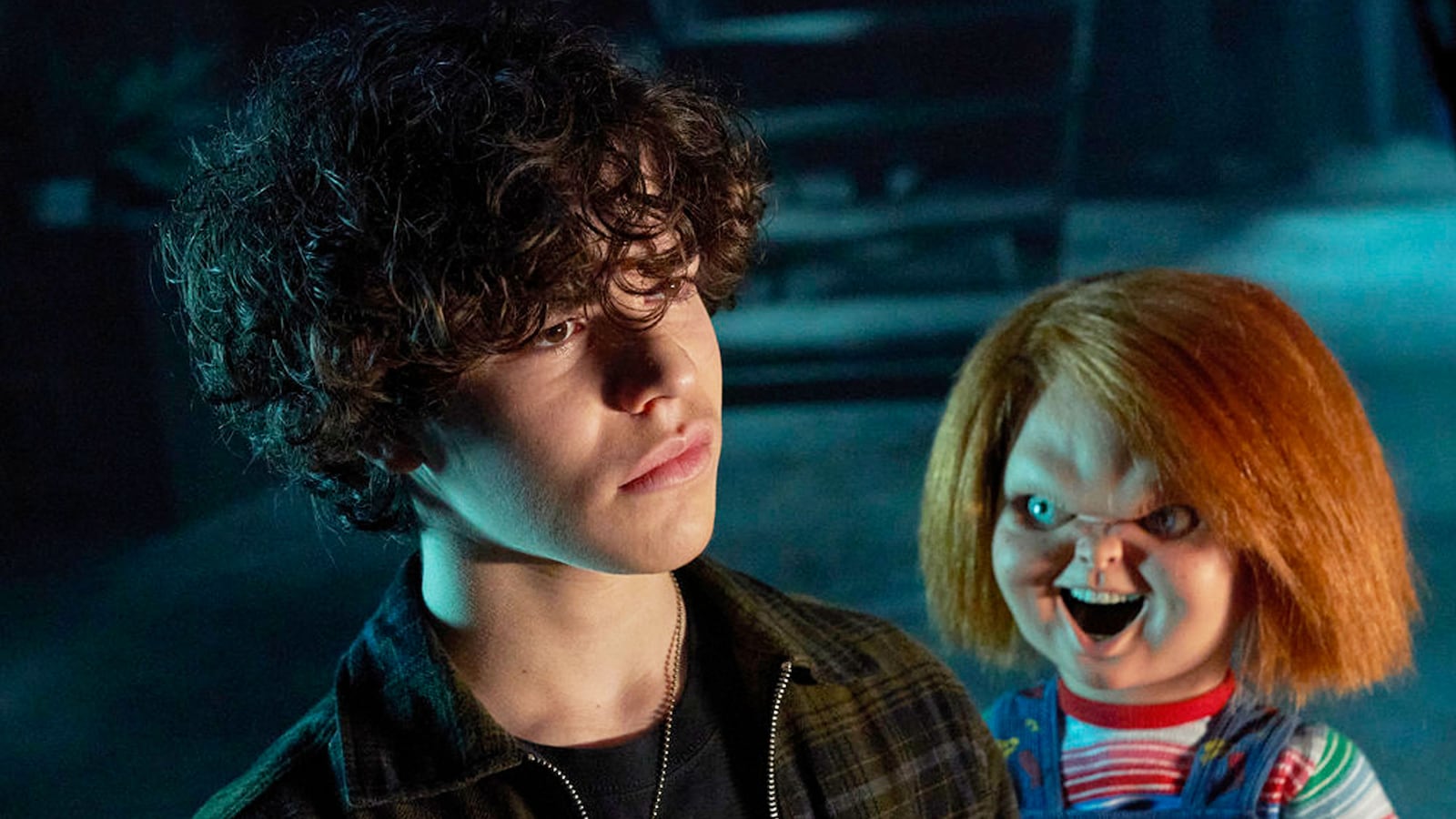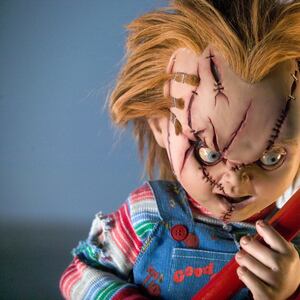Don’t worry if you haven’t been keeping up with the Child’s Play mythology, which most recently continued in two direct-to-video sequels, 2013’s Curse of Chucky and 2017’s Cult of Chucky—Syfy/USA Network’s new Chucky (Oct. 12) is an extension of the series that’s tailor-made for newbies. All you need to know is that Chucky (voiced by Brad Dourif) is still a red-headed, freckle-faced Good Guys doll who’s possessed by serial killer Charles Lee Ray and likes to murder everyone and anyone in his vicinity. He cackles a lot, adores bad puns, wears overalls, and has a hilariously evil plastic grin and snarl.
In the past, Chucky has tried to transfer his soul out of his kid’s-toy shell and into a young human vessel—namely, his long-time adversary Andy Barclay (Alex Vincent)—and hooked up with homicidal girlfriend Tiffany Valentine (Jennifer Tilly), and his sagas have ranged from straightforward slasher-thrillers to tongue-in-cheek horror comedies. Chucky straddles those two modes while casting him as a boogeyman with a new main motivation: serving as the murderous mentor to his latest owner Jake Wheeler (Zackary Arthur), who buys Chucky at a yard sale where he explains to the seller that the difference between vintage and retro has to do with monetary value.
Jake’s attraction to Chucky stems from his guiding interest in making sculptures out of doll heads, much to the dismay of his working-class father Lucas (Devon Sawa), who wishes his outcast son wasn’t so strange—and gay. Jake’s homosexuality is also ridiculed by his cousin Junior (Teo Briones), whose wealthy parents Logan (also Sawa) and Bree (Lexa Doig) wind up becoming Jake’s legal guardians after Lucas falls victim to an electrical accident that, of course, is the handiwork of Chucky.
Jake’s sexual preference is a front-and-center concern for Chucky, since defining one’s identity is at the heart of its story. Jake is a poor kid who struggles to acclimate to his new upper-class environs with Logan, Bree, and Junior; who doesn’t know how to handle his feelings for his crush, true crime podcaster Devon (Bjorgvin Arnarson); and whose anger at the world—and, in particular, at Junior’s girlfriend Lexy (Alyvia Alyn Lind), a prototypical mean girl who uses social media to humiliate Jake—makes him susceptible to Chucky’s charms. Naturally integrating Instagram and Google into the plot, franchise mastermind Don Mancini (who penned all eight episodes, and directed the first) updates his saga for a 2021 American teen culture in which technology allows kids to figure out who they are, how they fit in, and what the deal is with all the murders that seem to be happening in their sleepy hometown.
Chucky is set in Hackensack, New Jersey, the birthplace of Charles Lee Ray, and that coming-home-again angle, along with various other touches—for example, flashbacks to young Charles Lee both in a clown costume and hiding from a knife-wielding fiend in a slatted-door closet—lend the material a rather overt Halloween vibe. It’s not exactly clear why Mancini wants to nod to another famous slasher-cinema compatriot, but it doesn’t negate the distinctive Child’s Play-ish quality of these proceedings. Mancini and company indulge in familiar Chucky-POV shots scored to the pitter-patter of the doll’s feet as he races toward his intended targets, and their use of canted angles heightens the self-consciously malevolent mood. The show is never outright scary, yet that too feels in keeping with its predecessors, which were by and large entertaining because of their gleeful R-rated puppet outrageousness.
Unlike the 2019 theatrical reboot featuring Mark Hamill as the pint-sized villain, Chucky sticks with long-time voice star Dourif, whose promises and propositions sound as tempting as his growled threats and one-liners prove menacing. By slamming Lexy in public via an impromptu faux-ventriloquist routine at a school talent show, Chucky makes his true nature known to Jake. Thereafter, the doll attempts to convince him that he should pick up a butcher knife and begin his own career as an executioner. At the same time, the series presents intermittent glimpses of Charles Lee’s childhood transformation into the lunatic he ultimately became. That process was facilitated by his own run-in with a local serial killer, and continued at summer camp with an admiring underling, who—in one of many references to the prior movies—is revealed to be Charles Lee’s eventual partner-in-crime, Eddie Caputo.
More amusing than such fan service, however, is Chucky’s profane gusto. Chucky is a foul-mouthed little bastard with a devious sense of humor, and the show’s best moments allow him to strike out on his own, as with a Halloween-night prank that he pulls on an unsuspecting mother who unwisely forgets to check her treat for a razor-blade trick. While the main characters’ dynamics are straightforward, mostly revolving around issues of bullying and the resultant desire for brutal payback, Mancini makes sure to energize each episode with a bit of gruesomeness and absurdity, never losing sight of the fact that the show’s primary appeal is Chucky and the inventive carnage he creates in communities that are vulnerable precisely because they can’t comprehend a plaything being a legitimate threat.
By the conclusion of its fourth episode (which were all that was provided to press), Chucky establishes a number of interpersonal conflicts that are ripe for Chucky to exploit, some of them involving Devon’s police-officer mom and Lexy’s weirdo sister Caroline (Carina Battrick), who has an unhealthy (and unholy?) fondness for Chucky. Though none of its human performances are outstanding—Arthur, in particular, affects the same pained expression throughout—they’re no worse than the turns found in your average slasher movie. Hints that franchise stalwarts Vincent, Tilly and Fiona Dourif may eventually make an appearance will surely please die-hards eager to see the series’ convoluted past intrude upon this new present. Yet like Starz’s similarly lighthearted Ash vs Evil Dead, Chucky works because it’s reverential and yet not consumed with rehashing that which came before. It won’t win over many new converts, but anyone with a soft spot for the cheery maniac doll will no doubt get a kick out of his latest reign of terror.







